Tehran's Historic Azadi Square at Risk of Demolition
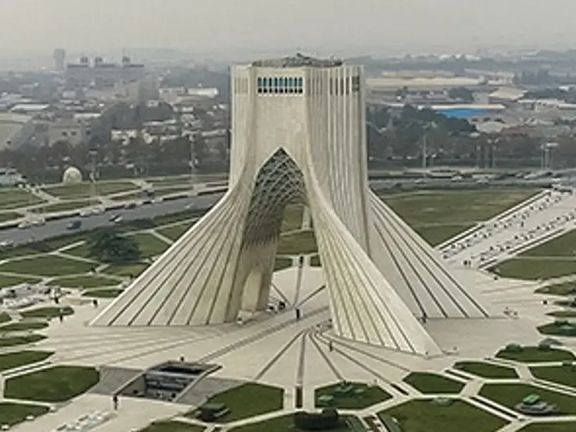
Tehran's historic Azadi Square, one of the city's most cherished landmarks, is scheduled for demolition within the next month, according to documentation revealed on social media.

Tehran's historic Azadi Square, one of the city's most cherished landmarks, is scheduled for demolition within the next month, according to documentation revealed on social media.
The news has sparked outrage among Iranians online, who suspect the project to be a decision by Tehran’s hardline Mayor, Alireza Zakani, known for his recent initiatives to construct mosques in city parks.
Social media users are rallying support, urging fellow Iranians to disseminate the information to help safeguard the national symbol from destruction.
Alireza Nadali, the spokesperson for the Tehran City Council, denied the rumors, stating, "Azadi Square is the most important symbol of freedom-seeking in our country and will not be demolished under any circumstances."
Nadali added, "In fact, we are reviewing a plan that aims to preserve Azadi Square with its current identity and appearance, and to further develop it as a cultural square with a focus on the discourse of the Islamic Revolution."
Azadi Square, historically known as Shahyad Square before the Islamic Revolution, was commissioned by Mohammad Reza Pahlavi, the last Shah of Iran, originally designed to commemorate the 2,500th anniversary of the Imperial State of Iran. One of the most beloved symbols of the city, it ranks as the third most recommended site for tourists, following museums and palaces.
Last week, Hossein Amanat, the designer and chief architect of the Azadi Tower who has projects in Iran, China, the Middle East and North America, was awarded an honorary doctorate by the University of British Columbia in Canada. Born into a Baha'i family, Amanat moved to Canada a year following the 1979 revolution.
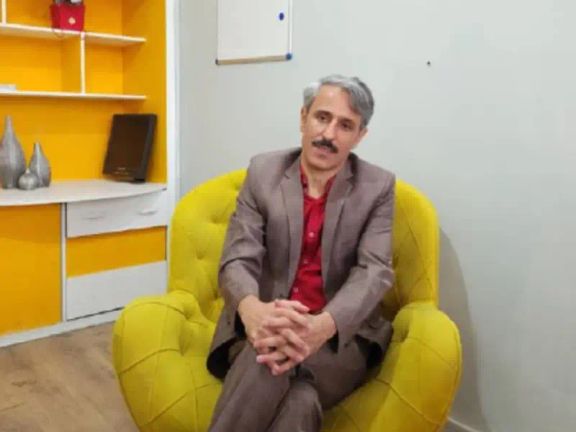
Hassan Bagherinia, a dissident and former faculty member at Iran’s Hakim Sabzevari University, has been arrested after Iranian security forces conducted a raid on his residence, confiscating all electronic devices.
His daughters were also threatened not to speak out about the raid in which his family's devices were also confiscated.
Bagherinia, an assistant professor in the Department of Educational Sciences and Psychology, was dismissed from his university role due to his vocal opposition to the government's violent crackdown on protesters during the 2022 uprising in Iran in which over 500 Iranians were killed.
Undeterred by his dismissal, he continued to publicly criticize the authoritarian policies and the leadership of Supreme Leader Ali Khamenei.
In a video made prior to his arrest, Bagherinia criticized what he called "illegal actions" during his dismissal. He stated, "The Islamic Republic thinks it can maintain its rule by arresting and detaining people, but Mr. Khamenei... this era of yours will also pass. Long live Iran. Woman, life, freedom."
Despite the efforts to silence him, no formal charges have been brought against Bagherinia and his current whereabouts remain undisclosed. His arrest has sparked outrage among the academic community, with 100 academics from across Iran condemning his dismissal and the continued governmental policy of purging universities of critics, a practice that has intensified since the presidency of Ebrahim Raisi began.
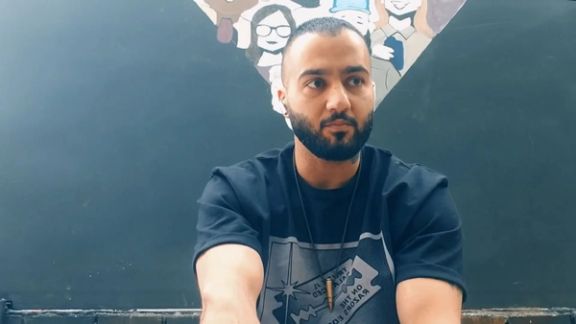
The Human Rights Foundation (HRF) announced the winners of the Václav Havel International Prize for Creative Dissidence 2024, among whom is the imprisoned Iranian rapper facing a death sentence, Toomaj Salehi.
The winners of this year’s Havel Prize will be recognized during a ceremony this Tuesday 4 June, at the Oslo Freedom Forum (OFF) 2024 in Oslo, Norway.
Negin Niknaam, a friend and leading advocate for Salehi’s freedom and admin of Toomaj Salehi’s social media pages, will accept the award on his behalf. Speaking to Iran International English on Sunday on her way to Oslo ahead of the event, Niknam stated:
“I am attending the event with a heavy heart as Toomaj remains behind cold prison bars, but a deep sense of pride for his resilience and art. This award validates Toomaj’s fight for freedom of speech and expression, further highlighting the ongoing plight of Iranians held hostage by the Islamic Republic.”
In his music, Salehi advocates for justice and human rights in Iran in protest of the suppression of the Iranian people. At the peak of Iran’s nationwide Woman, Life, Freedom uprising sparked by the killing of Mahsa Amini in morality police’s custody, Salehi released a song in support of the Iranian people.
The song was titled “Divination” with the lyrics, “Someone has lost their young child and someone has lost their youth… Someone was dying before the execution of justice… Someone's crime was, dancing with her hair in the wind.” It reflected the brutality of Iranian authorities in their crackdown on the protests, which resulted in the killing of at least 500 protestors and over 20,000 detained including Toomaj himself.
In addition to Salehi, Uyghur poet and activist Tahir Hamut Izgil, and Venezuelan pianist and recording artist Gabriela Montero are amongst this year’s Havel Prize winners.
“Every year, the Havel Prize celebrates individuals who, with courage and creativity, unmask tyranny and embody the concept of ‘Living in Truth,’ as relevant today as when it was articulated by Václav Havel almost 45 years ago. Their work stands as a testament to extraordinary bravery and ingenuity,” HRF Founder Thor Halvorssen said in a statement.
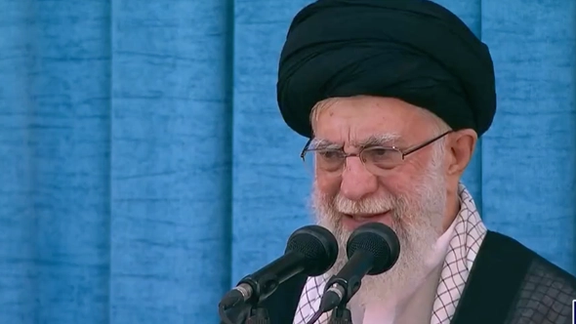
Iran’s Supreme Leader Ali Khamenei on Monday openly endorsed the October 7 Hamas attack on Israel, saying “Our region was very much in need of this attack.”
Khamenei was speaking at a ceremony marking the 35th anniversary of Ayatollah Ruhollah Khomeini’s death, who was the founder of the Islamic Republic.
Khomeini believed that Palestinians should not rely on negotiations for compromise and must take action themselves to claim their rights and force the enemy to retreat, Khamenei said.
The Supreme Leader praised the attack “as a huge blow to Israel," signaling an escalation in rhetoric from Tehran. He also accused the United States and Israel of orchestrating a vast scheme aimed at altering regional dynamics, further intensifying the geopolitical tensions in the Middle East.
Khamenei reiterated that the October 7 attack shattered a long-term plan by the US, Israel, and some regional countries to change existing dynamics and establish ties with Jerusalem. "Given the situation over the past eight months, there is no hope for reviving such a plan."
"The Zionist regime has completely misjudged the capabilities of the resistance front," he added. "The Zionist regime is melting before the eyes of the world... They have, by their own actions, entered a dead-end corridor from which failures continue to follow one after the other, and from which they will not be able to escape."
The Islamic government in Iran has staunchly backed Palestinian and other militant groups in the region during Khamenei's 35-year authoritarian rule.
In many stances, it was Tehran’s Revolutionary Guard that created armed groups in Lebanon, Iraq, Yemen and Syria, providing both financial and military support, mainly with the aim of weakening Israel and the United States.
In November, Khamenei urged Muslim nations to blockade Israeli trade, after which Yemen’s Houthis began targeting international commercial ships in the Red Sea and the Indian Ocean, disrupting trade.
Khamenei on numerous occasions hailed the October 7 attack but implicitly denied Tehran’s direct involvement in the operation. He reiterates Tehran’s long-held policy of demanding a referendum to decide the fate of Palestine and Israel, but at the same time calls for the “Al-Aqsa Flood” to be repeated, which was in essence an attack on civilians and widespread and indiscriminate killings.
He harshly decries the Israeli attacks in Gaza, without mentioning that the campaign began after Hamas killed 1,200 people in Israel, mostly civilians. He insists that Israel’s military operation has been a disgrace for the United States and other Western countries that have supported it.
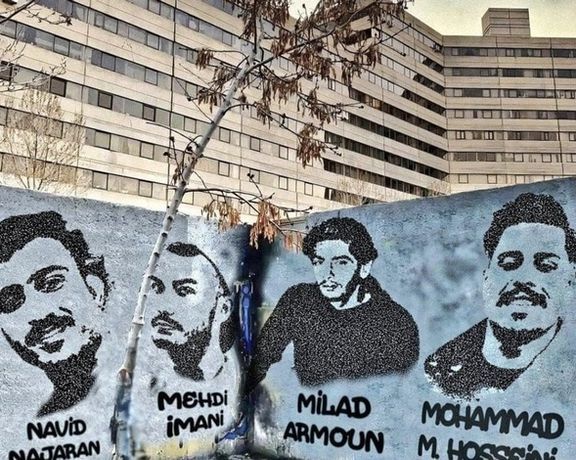
The prolonged detention and transfer of four individuals accused in the high-profile 'Ekbatan case' to the notorious Ward 2A of Tehran’s Evin prison has sparked growing concerns amongst rights groups.
Their transfer has deepened fears about their well-being, the possibility of forced confessions through torture, potentially leading to severe sentences including the death penalty.
Milad Armoun, Navid Najaran, Mohammad Mehdi Hosseini, and Mehdi Imani, who have been imprisoned for almost two years, were transferred for re-interrogation to Ward 2A from Ghezel Hesar Prison in Tehran on April 30 as per reports by Human Rights Activists in Iran (HRA) on Friday. HRA reported these individuals have been in custody for 18 months, and only recently allowed brief phone calls with their families.
Sources close to their families have also warned of their families being threatened into silence and not speaking to the media.
Mohammad Hossein Aghasi, one of the lawyers of the detainees, had previously confirmed on X, in response to queries from activists about reports of their transfer to Ward 2-A and re-interrogation, stating that the detainees are in the “IRGC Intelligence [detention center]” in the process of completing “investigations” at the court’s request.
However, the pro-bono legal group, Dadban, reported on Sunday that they have been detained in Ward 2A for almost three months, citing irregularities in legal proceedings, and urging lawyers to not remain silent on the case proceedings.
Until recently, news of Navid Najarian being imprisoned concerning this case or even the date of his arrest was unknown.
Former political prisoner and activist, Foad Choobin who had met Najaran while he was imprisoned in Ahvaz Central Prison in Khuzestan Province wrote on X confirming Najaran’s date of arrest being December 5, 2022, and further revealed that he had been denied legal representation, subject to beatings and forced confessions in another IRGC Intelligence detention facility last year as well.
Ekbatan Case: Rights Violations, Forced Confessions and State Propaganda
The Ekbatan case traces back to November 2022 at the height of nationwide protests sparked by the death of Mahsa Amini who died in the custody of morality police.
A Basij force member, Arman Aliverdi, was allegedly murdered in Ekbatan on the evening of October 26, 2022, leading to a crackdown by security forces. Over 50 young residents were arbitrarily detained, with 14 facing charges such as Moharebeh (waging war against God), “assembly and collusion against national security”, “participation in intentional homicide”, and “disrupting of public peace and order." Of those arrested, some were released on bail. However, Armoun, Najaran, Hosseini, and Imani remain imprisoned and their transfer to Ward 2A further exacerbates their situation.
Following Aliverdi’s death, the late Iranian President Ebrahim Raisi visited the family of Aliverdi and Iran’s Supreme Leader Ali Khamenei also visited his grave.
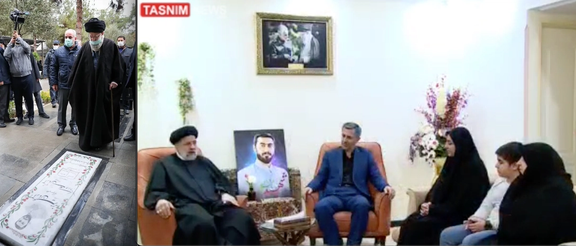
A large state-sponsored funeral was held for Aliverdi. State media highlighted his role in suppressing protests, portraying him as a hero, naming him a “martyr”, and a dedicated student Basij member.
Meanwhile, the detainees were subject to forced confessions. Armoun was shown on state media, blindfolded, and handcuffed.
The Iranian government has a history of broadcasting forced confessions from detainees, a practice widely criticized by human rights organizations. Such confessions are often used as evidence in court to convict political prisoners, a tactic that Amnesty International and other groups have consistently condemned.
However, even those appearances, Armoun publicly denied involvement in Aliverdi’s death, contradicting statements made by Tehran's police chief.
"The case has many fundamental flaws," stated Dadban, quoting Payam Derafshan, one of the defense lawyers who pointed out inconsistencies and illegal actions in the judicial process. "Milad Armoun has clearly stated that he never had any weapon in his hand."
Why Rights Groups Concerned About Transfer to Evin’s Ward 2A
Ward 2A of Evin Prison is operated illegally by the Islamic Revolutionary Guard Corps (IRGC). Even officials of Iran Prisons' Organization have no access to prisoners in this ward as per reports of multiple human rights organizations including, the New York-based Center for Human Rights in Iran (CHRI).
“Prisoners in Ward 2A are confined in either solitary or shared cells and are completely cut off from the outside world. Political prisoners and prisoners of conscience inside this ward are routinely subjected to beatings and inhumane torture for forced confessions," CHRI states.
Accounts of past political prisoners who have been kept at Ward 2A throughout the years reveal shocking accounts of torture, threats of rape, beatings and forced confessions.
“This is [Ward] 2A and god can’t hear you,” the interrogators at Ward 2A of Evin prison told Arash Sadeghi, a prominent human rights activist and former political prisoner who had been taken to this ward previously.
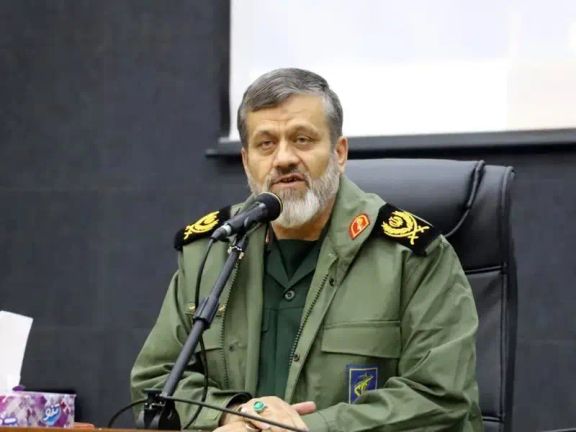
The IRGC's commander in Qazvin has made a bizarre claim that the United States had sent Iran a written message supporting its right to retaliate against Israel in spite of the two nations having no direct channels of communication.
Rostamali Rafiei Atani stated that Washington urged Tehran to "lower the level of revenge." The claims come in the wake of the US coming to Israel's aid after an unprecedented attack from Iran.
On April 13, Iran launched hundreds of explosive drones and missiles in retaliation for what Iran claims was an Israeli strike on its consulate in Damascus that killed seven IRGC officers. The US led a coalition of nations, including the UK, to support Israel in intercepting the majority of the 350 or more projectiles.
However, in the Sunday statement, Rafiei went on to say that "the Israelis and the British have sent messages saying they are ready to negotiate," while the British security services say Iran is one of the country's biggest foreign threats on its soil and Israel vows to do all it can to prevent Iran getting a nuclear weapon.
The Biden administration, however, rejected Rafiei's remarks on Sunday afternoon, telling the Washington Free Beacon that the remarks are "false" and such an exchange of message "did not happen."
This is not the first instance of an Iranian official making claims that cannot be independently verified. On Thursday, the IRGC-affiliated Tasnim news agency reported that Amirali Hajizadeh, a senior commander of the Revolutionary Guard, stated Israel had offered compromises in Gaza through communications mediated by Egypt's foreign minister to forestall further Iranian retaliation.
Despite the claims, the situation on the ground suggests otherwise. Israel has intensified its military operations into Rafah, the last Hamas stronghold in southern Gaza. The escalation persists even amid warnings from the International Criminal Court, as Israel continues its campaign to dismantle Hamas and secure the release of 125 hostages reportedly held in Gaza.
Tweet unavailable
Tweet unavailable